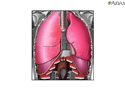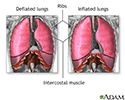Breathing difficulty - lying down
Waking at night short of breath; Paroxysmal nocturnal dyspnea; PND; Difficulty breathing while lying down; Orthopnea; Heart failure - orthopnea
Breathing difficulty while lying down is an abnormal condition in which a person has a problem breathing normally when lying flat. The head must be raised by sitting or standing to be able to breathe deeply or comfortably.
A type of breathing difficulty while lying down is paroxysmal nocturnal dyspnea. This condition causes a person to wake up suddenly during the night feeling short of breath.
Considerations
This is a common complaint in people with some types of heart or lung problems. Sometimes the problem is subtle. People may only notice it when they realize that sleep is more comfortable with lots of pillows under their head, or their head in a propped-up position.
Causes
Causes may include:
- Chronic obstructive pulmonary disease (COPD)
- Cor pulmonale
- Heart failure
- Obesity (does not directly cause difficulty breathing while lying down but often worsens other conditions that lead to it)
- Panic disorder
- Sleep apnea
- Snoring
Home Care
Your health care provider may recommend self-care measures. For example, weight loss may be suggested if you are obese.
When to Contact a Medical Professional
If you have any unexplained difficulty in breathing while lying down, call your provider.
What to Expect at Your Office Visit
The provider will perform a physical exam and ask questions about the problem.
Questions may include:
- Did this problem develop suddenly or slowly?
- Is it getting worse (progressive)?
- How bad is it?
- How many pillows do you need to help you breathe comfortably?
- Is there any ankle, foot, or leg swelling?
- Do you have difficulty breathing at other times?
- How tall are you? How much do you weigh? Has your weight changed recently?
- What other symptoms do you have?
The physical exam will include special attention to the heart and lungs (cardiovascular and respiratory systems).
Tests that may be performed include the following:
Treatment depends on the cause of the breathing problem.
You may need to use oxygen.
References
Braithwaite SA, Wessel AL. Dyspnea. In: Walls RM, ed. Rosen's Emergency Medicine: Concepts and Clinical Practice. 10th ed. Philadelphia, PA: Elsevier; 2023:chap 21.
Fajardo E, Davis JL. History and physical examination. In: Broaddus VC, Ernst JD, King TE, et al, eds. Murray and Nadel's Textbook of Respiratory Medicine. 7th ed. Philadelphia, PA: Elsevier; 2022:chap 18.
Januzzi JL, Mann DL. Approach to the patient with heart failure. In: Libby P, Bonow RO, Mann DL, Tomaselli GF, Bhatt DL, Solomon SD, eds. Braunwald's Heart Disease: A Textbook of Cardiovascular Medicine.12th ed. Philadelphia, PA: Elsevier; 2022:chap 48.
McMurray JJV, Pfeffer MA. Heart failure: management and prognosis. In: Goldman L, Schafer AI, eds. Goldman-Cecil Medicine. 26th ed. Philadelphia, PA: Elsevier; 2020:chap 53.
Review Date: 2/2/2023
Reviewed By: Linda J. Vorvick, MD, Clinical Professor, Department of Family Medicine, UW Medicine, School of Medicine, University of Washington, Seattle, WA. Also reviewed by David C. Dugdale, MD, Medical Director, Brenda Conaway, Editorial Director, and the A.D.A.M. Editorial team.














